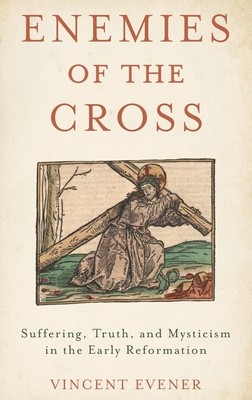
- Išsiųsime per 10–14 d.d.
- Autorius: Vincent Evener
- Leidėjas Oxford University Press, USA
- ISBN-10 : 0190073187
- ISBN-13 : 9780190073183
- Formatas: 16.5 x 23.9 x 3.6 cm, kieti viršeliai
- Kalba: Anglų
- Extra -15 % nuolaida šiai knygai su kodu: ENG15
Atsiliepimai
Aprašymas
Enemies of the Cross examines how suffering and truth were aligned in the divisive debates of the early Reformation. Vincent Evener explores how Martin Luther, along with his first intra-Reformation critics, offered "true" suffering as a crucible that would allow believers to distinguish the truth or falsehood of doctrine, teachers, and their own experiences. To use suffering in this way, however, reformers also needed to teach Christians to recognize false suffering and the false teachers who hid under its mantle. This book contends that these arguments, which became an enduring part of the Lutheran and radical traditions, were nourished by the reception of a daring late-medieval mystical tradition -- the post-Eckhartian -- which depicted annihilation of the self as the way to union with God. The first intra-Reformation dissenters, Andreas Bodenstein von Karlstadt and Thomas Müntzer, have frequently been depicted as champions of medieval mystical views over and against the non-mystical Luther. Evener counters this depiction by showing how Luther, Karlstadt, and Müntzer developed their shared mystical tradition in diverse directions, while remaining united in the conviction that sinful self-assertion prevented human beings from receiving truth and living in union with God. He argues that Luther, Karlstadt, and Müntzer each represented a different form of ecclesial-political dissent shaped by a mystical understanding of how Christians were united to God through the destruction of self-assertion.Enemies of the Cross draws on seldom-used sources and proposes new concepts of "revaluation" and "relocation" to describe how Protestants and radicals brought medieval mystical teachings into new frameworks that rejected spiritual hierarchy.
EXTRA 15 % nuolaida
Kupono kodas: ENG15
Akcija baigiasi už 1d.00:01:34
Nuolaidos kodas galioja perkant nuo 10 €. Nuolaidos nesumuojamos.

- Autorius: Vincent Evener
- Leidėjas Oxford University Press, USA
- ISBN-10: 0190073187
- ISBN-13: 9780190073183
- Formatas 16.5 x 23.9 x 3.6 cm, kieti viršeliai
- Kalba: Anglų
Enemies of the Cross draws on seldom-used sources and proposes new concepts of "revaluation" and "relocation" to describe how Protestants and radicals brought medieval mystical teachings into new frameworks that rejected spiritual hierarchy.



Atsiliepimai